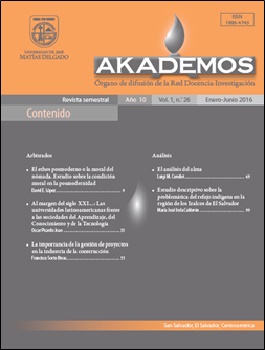The postmodern ēthos or the morality of the nomad. Study on the moral condition in postmodernity
DOI:
https://doi.org/10.5377/akademos.v1i26.4435Keywords:
ethics, moral, modernitity, posmodernity, character, habit, virtue, metanarrative, utopiaAbstract
Posmodernity can be thought as an ēthos, that is to say, it could be viewed as a way of being or as a moral character. This way of being could be featured, on the one hand, as something leaving aside the modern point of view and due to its incredulity in utopies, and, on the other hand, by raising of a new ēthos: a moral life without restrictions and regulations, an invalidity of ideas in regulation or cathegorical imperatives of worldwide worth, a worship to diversity and plurality, a refusing to any historical project, an axiological relativism and subjectivism, a freedom of sexual intercourse of any traditional moral compulsion, an encouragement of superficial, liquid and ephemeral interpersonal relationships. All these things raise disenchantment and dissatisfaction. Claiming this point of view and celebrating it as breaking the chains of oppression or as the non plus ultra of history means being postmodern. When we study this postmodern condition we can not circumscribe ourselves to a mere description, but we ought to explain it and propose a new ēthos.
AKADEMOS, Year 10, Vol. 1, No 26, January-June 2016: 9-33
Downloads
2407

